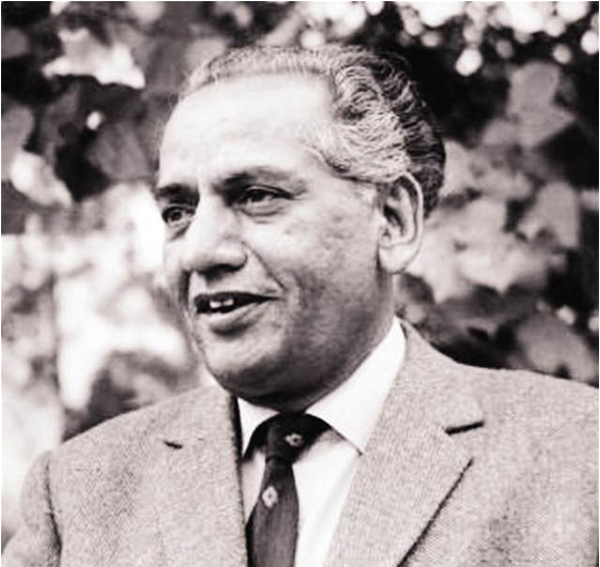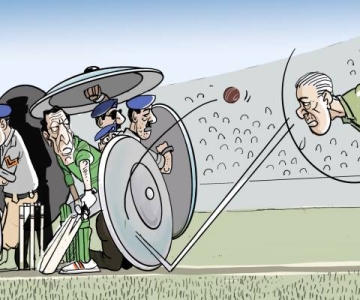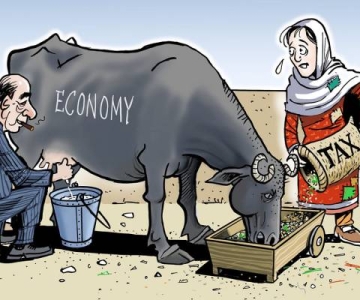In a powerful exploration of resistance poetry in indigenous languages, I discovered marginalized poets challenging mainstream Pakistani identity in moving verse.
Much has been said about the literary and artistic revolution of Pakistan. Undoubtedly Pakistani writers, artists and musicians are now recognised globally for their work which engages with the world and brings forth perspectives which alter the unidimensional image of the country. At home, the new wave of literary and creative output is celebrated each year at the Karachi and Lahore literature festivals which have emerged as major venues for conversation and showcasing of what is being produced in the mainstream.
Away from the spotlight of international media and TV channels, Pakistan’s regional poets and writers are waging a far more perilous battle by engaging with their subaltern, marginalised audiences in the local idiom, thereby putting themselves at risk. The days of Faiz and Jalib are not over as we often moan. Instead they have deepened and regionalised. Our region has had a rich, ongoing folk tradition and it continues in myriad forms and expressions now. In India, Bangladesh and Pakistan poets and artists continue to challenge power and injustice. More so in Pakistan where instability, extremism and uncertainty have impacted people in a profound manner for the past few decades.
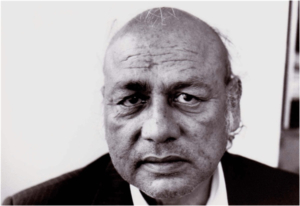
With the growth of social media, Facebook has emerged as an arena for dissent and regional expression. Despite the censorship of several pages and websites by the state, the outpouring of anger and frustration continues. Concurrently, the extremist opinion also uses the internet to its advantage. Having pushed out of the mainstream electronic media, I have spent a bit more time on Facebook learning about what Pakistanis are saying and discussing. Admittedly, the conservatives and the mainstream politics such as the narratives pushed by Pakistan Tehreek Insaf (PTI) override everything else, but there is also a far greater space for progressive voices. I do not wish to go into further detail here as the purpose of this essay is to discuss a powerful and moving Seraiki poem that I came across on Facebook.
This poem is by Zafar Jatoi, a Seraiki poet that echoes the emotion of any sensitive Pakistani. The poem is about the loss and distortion of dreams and identity; and of losing all colours of existence except one, and that being the hue of radicalisation. While some in Pakistan, and now its powerful Army, have come to realise the depth and extent of radicalisation, it is only a recent development. For the last one decade, phrases such as extremism and radicalisation were considered as Western ploys to defame Pakistan and it was thought that the entire problem of extremist ideology was a reaction to the US presence in Afghanistan. Jatoi is a voice from the depths of the Seraiki hinterland, echoing what many feel about their land now gifted to a complex web of seminaries and militant outfits that have destroyed the region once known for its Sufi tradition and pluralism. My translation is imperfect but I would like to acknowledge Saleem Malik and Munawar Rind, my friends, for making me wade through the depths of the Seraiki idiom.
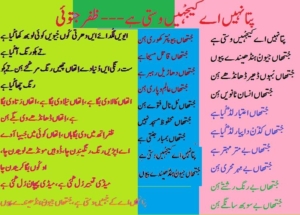
My dream ruined
My identity ruined
What kind of a place is this?
Where friends are not friends
Where beloveds are devoid of love
Relationships have no feeling
Where associations are empty
Where fathers and sons fight
What kind of place is this?
What kind of a place is this?
Where I hardly can breathe
Where I barely live
Where beasts inhabit
Where few humans are left
Where trust has evaporated
Where love has disappeared
Where strangers surround me
Where affection has gone
After moaning the loss of the world he knew, Zafar does plain talk in the folk tradition and that of resistance poetry:
What sort of a place is this?
Where a murderer is a messiah
Where the teacher has become a trader
Where a dacoit is a leader
Where a bigot is a teacher
Where you can buy fatwas
Where the mosque is not safe
Where a bomber is sacred
What kind of a place is this?
After the specific protest, Jatoi turns metaphysical and existential. Narrating how diversity has been robbed of the land he belongs to, he uses powerful images to deride the imposition of a singular ideology:
It seems that this land
Has been consumed by greed
In the world of seven colours
Six colours are dead
And only one colour survives
Here black is also white
Here blue is also white
Here red is white too
Here animals are white too
Even I have turned ash-white
Zafar, here I am colourless too
If someone like me [adherent of diversity] exists
He, too, is overpowered
And turned colourless
Jatoi’s protest is not different from the powerful modern Pashtun poetry that has been challenging Talibanisation. Shaheen Buneri, a journalist associated with Radio Free Europe/Radio Liberty (RFE/RL) Mashaal Radio, wrote in 2012 that over a hundred poetry collections were published in 2011. Buneri in his essay Poetry Fights Back (January 2012, Boston Review) cited these powerful lines by Zarin Pareshan:
I could not care less if it’s a mosque or a temple filled with idols
Where my beloved lives, that is my Ka’aba
You religious fundamentalists stop this bloodshed
Humanity is the best religion; love, the best worship
Because of this war I despise the dear mullah
Love is my religion; unity is my faith
The tone of this reminded me of a celebrated Baloch poet Ata Shad and his poem Sah Kandin:
Efforts to put a curb
on the peoples consciousness
is an exercise in futility.
Consciousness cannot be snatched away by death;
it is everlasting, ever vigorous,
like overwhelming love and affection.
This is why the nationalists use poetry of Baloch poets to locate their current struggle for rights:
A people’s spirit cannot be destroyed by killings;
they remain restless, ever resentful.
This restlessness and resentment lead the people to their ultimate goal,
freedom.
(translations by Jan Muhammad Dashti)
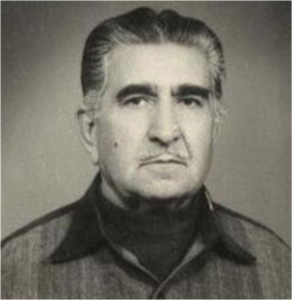
Ata Shad is one of the three major modern poets, the other two being Sayyid Zahur Shah Hashimi (1926-1978) and the iconic Gul Khan Nasir whose lines are used by Baloch youth today. In fact, the poetic expression informs us of the extent of disquiet and it is sad that the Pakistani state has yet to appreciate that and deal with it in a democratic manner. These lines from Sayyid Zahur Shah Hashimi’s Sistage dastunk haunt me:
My heart bleeds
to wet the barren land of my miserable people
In the hope that one day these lands will turn green
and there will grow red flowers
I will gather the seeds of those flowers
because these are from
my blood
Islamabad might help itself to read these lines from the same poem and accordingly decide if it needs to change its approach:
We do not want your buildings
do not set our huts on fire;
We do not require your forts,
do not surround our hills;
We do not need your stores,
do not ravage our fields;
We do not demand your ships,
do not destroy our boats
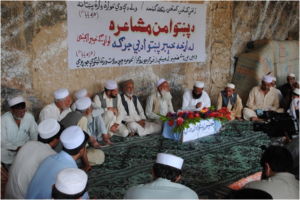
Themes of resistance, nationalism and identity are also replete in modern Sindhi poetry
Themes of resistance, nationalism and identity are also replete in modern Sindhi poetry. For decades, Shaikh Ayaz’s poetry has been an anthem for nationalists. And there continues to be resistance to the Islamist ideology in contemporary poetry despite the fact that Sindh is also being turned into a militant zone. The Feb 1 attack in Shikarpur where 61 people were bombed in an Imambargah comes as culmination of that unfortunate trend.
After the December 16 Peshawar massacre, grief-struck as most, I turned to Rahmat Shah Sail’s poem on Peshawar City of Flowers:
When your pretty flesh is plucked like the petals of a flower
I watch in silence, for I have no power
When your precious blood is turned to drizzling rain
I perform your funeral rites with tears, for I have no power
O Peshawar! Our love is ancestral
I would never let you turn to smoke while I watch
O Peshawar! We share the blood of life, you and I
I’d never let you disappear while I watch
We are witnessing the force of history
O Peshawar! Bombs don’t suit you
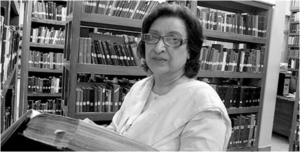
Not all Pashtun poets have had the freedom to openly express themselves. In the tribal areas of north and south Waziristan, many have faced Taliban-imposed censorship. After the launch of Zarb e Azab and with the mass exodus of people from the agency, dozens of poets also arrived in Bannu and soon they were back to composing poetry. One of the poets Saleem Khan, once free of the adverse circumstances wrote about his life as a refugee:
..My dignity, don’t allow me to beg. Oh my poverty, you made me fight with my soul. Tell me, time, what kind of Pashtun I am that I have become so ugly.
In Parachinar, Speenghar Adabi Jirga advocates a secular society with participation of all sects
My dignity, don’t allow me to beg before anybody. Oh my poverty, you made me fight with my soul. (trans: Aamir Iqbal and Tim Craig)
Across FATA, literary organisations have been active in voicing their ideas. In Parachinar, Speenghar Adabi Jirga advocates a secular society with participation of all sects. They bring out a monthly publication called Speen Ghar. In Mohmand agency, Mohmand Adabi Ghuncha has been holding peace mushairas (poetry recitals). In Bajaur, Pukhto Adabi Tolana has been active and poets continue answering the call of their muse despite the conflict in the Khyber Agency. Mureeb Mohmand quoted a poet Saleem Zaheer Us Waziristanis are suppressed from all sides..not only are we victims of militancy but of Pakistani society as well. (Express Tribune, July 2014)
Akbar Sial, a Pashtun poet titled his collection No to War and in one of the poems (that I found courtesy Shaheen Buneri) Rulers of the World, says:
Don’t snatch the pen from our hand
With which we make the picture of our dreams
Don’t create violence in our village
Don’t bring mayhem to our village
Don’t turn this ancient playground
Into a blood-red ammo dump
In Urdu a much larger corpus of resistance poetry exists. Kishwar Naheed has immortalised the cowardice of terrorists who are afraid of young girls.
Strong men
afraid of little girls
Found everywhere
Identify them
They are capable of mischief
in this declining city
Be brave and have faith
Those afraid of little girls
are worthless in their existence
Fahmida Riaz continues to challenge orthodoxy and injustice. In her recent short poem she laments the society and the ruling classes in a classical style:
The long night has denuded the eyes of any light
The image of dawn turned out to be a mirage
So many fears lurk in the darkness
Every Khizar is suspicious, perhaps a looter
Every sleeve suspect of holding a dagger
Lost the belief, sincerity
Being robbed time and again
We have lost faith too
Whatever one predicts about the future of Pakistan and its discontents, its poetry is likely to flourish as it attempts to calm its wounded residents. More importantly, it is not giving up on the ideal of a secular, tolerant Pakistan.
